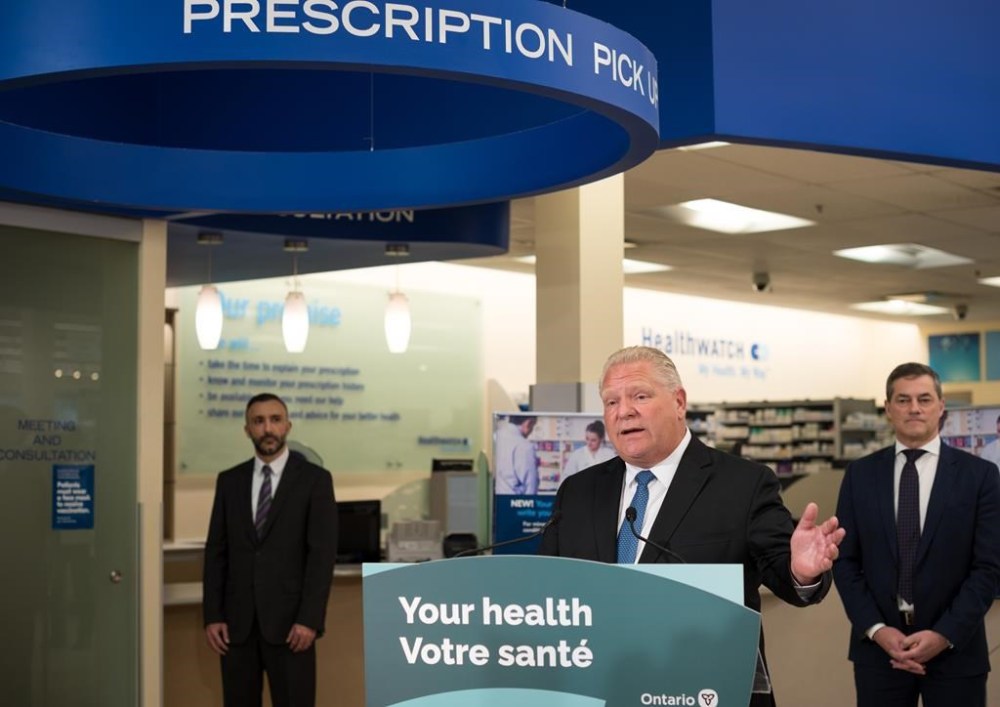Ontario willing to accept accountability if health-care funding increased: Ford
Advertisement
Read this article for free:
or
Already have an account? Log in here »
To continue reading, please subscribe:
Monthly Digital Subscription
$0 for the first 4 weeks*
- Enjoy unlimited reading on winnipegfreepress.com
- Read the E-Edition, our digital replica newspaper
- Access News Break, our award-winning app
- Play interactive puzzles
*No charge for 4 weeks then price increases to the regular rate of $19.00 plus GST every four weeks. Offer available to new and qualified returning subscribers only. Cancel any time.
Monthly Digital Subscription
$4.75/week*
- Enjoy unlimited reading on winnipegfreepress.com
- Read the E-Edition, our digital replica newspaper
- Access News Break, our award-winning app
- Play interactive puzzles
*Billed as $19 plus GST every four weeks. Cancel any time.
To continue reading, please subscribe:
Add Free Press access to your Brandon Sun subscription for only an additional
$1 for the first 4 weeks*
*Your next subscription payment will increase by $1.00 and you will be charged $16.99 plus GST for four weeks. After four weeks, your payment will increase to $23.99 plus GST every four weeks.
Read unlimited articles for free today:
or
Already have an account? Log in here »
Hey there, time traveller!
This article was published 11/01/2023 (1062 days ago), so information in it may no longer be current.
TORONTO – Ontario is willing to accept some strings from the federal government if they give the province more health-care funding, Premier Doug Ford said Wednesday.
Premiers and health ministers across the country have demanded more help by way of the Canada Health Transfer.
They want to see Ottawa cover 35 per cent of health-care costs across the country, up from the current 22 per cent.

“There always has to be accountability,” Ford said.
“So that’s the least of our issues. Do we want a little bit of flexibility? Yeah, and I think they’re willing to do that.”
Ford said he believes they’ll get a deal done with the federal government.
Premiers have previously said as a group they did not want any strings attached to the extra funding.
Prime Minister Justin Trudeau has said the funding increase will only happen if the provinces agree to reform and improve their health-care systems.
Federal Health Minister Jean-Yves Duclos’s office said Wednesday they continue to work with the provinces and territories on a new deal.
“This is encouraging news,” said spokeswoman Marie-France Proulx.
“We know we still have more collaborative work to do to achieve better health care for all Canadians, and that will continue to be our focus.”
The federal government wants to create a national health data system as a form of accountability that would include data on the provinces’ health-care workforce.
Quebec Premier François Legault has been particularly outspoken about not accepting any conditions on health-care funding.
But he said last month after a meeting with Trudeau he was “more optimistic” on a health-care deal.
The premiers want to sit down as a group with Trudeau to hammer out an agreement, but Ford said they are still waiting to hear back.
“I called every single premier in the last week to talk to (Trudeau) about different issues and we’re going to keep knocking on the door until the prime minister is able to sit down with us,” Ford said.
He said increasing health-care funding is “critical.”
“We can’t continue going at the rate without the support of the federal government.”
Pediatric hospitals across the country have been overwhelmed by really sick children over the past few months.
In Ontario, several major pediatric hospitals in Ottawa, Toronto and London have had to cancel surgeries in order to redeploy staff to intensive care units and emergency departments.
This past summer and fall, emergency departments across Ontario, in both rural and urban areas, had to close for hours or days at a time due to staffing shortages, particularly nurses.
The Ontario Medical Association, which represents doctors across the province, has said there is a backlog of one million surgeries, partially driven by the pandemic.
Ford said they need more “independent health centres” where surgeons can perform knee replacements, hip replacements and cataract surgeries in an effort to alleviate that backlog.
“We need to have facilities like that to take the burden off the hospital,” Ford said.
This report by The Canadian Press was first published Jan. 11, 2023.
–With files from Sarah Ritchie in Ottawa

